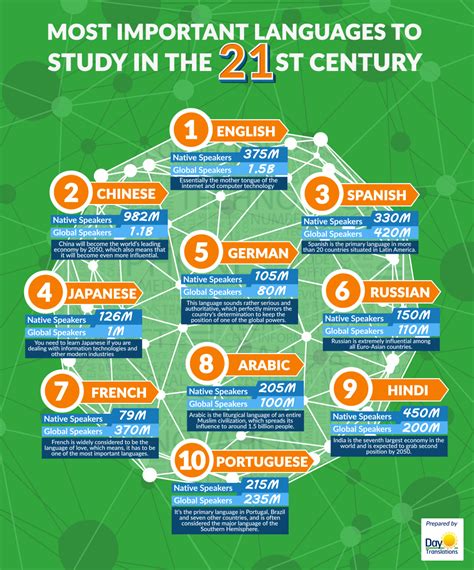Introduction
In today’s globalized world, proficiency in foreign languages is no longer a luxury but a necessity. With the rise of international trade, travel, and communication, the ability to communicate in multiple languages opens doors to countless opportunities for personal and professional growth.

This comprehensive guide explores the best foreign languages to learn in the 21st century, based on factors such as economic importance, global usage, ease of learning, and career prospects.
Top Foreign Languages for Economic Impact
According to the World Economic Forum, these are the top foreign languages with the highest economic impact:
| Rank | Language | GDP Impact (trillion USD) |
|---|---|---|
| 1 | Mandarin Chinese | 15.9 |
| 2 | English | 10.4 |
| 3 | Spanish | 5.9 |
| 4 | German | 4.8 |
| 5 | French | 4.2 |
Most Spoken Foreign Languages Globally
As of 2022, the most spoken foreign languages globally are:
| Rank | Language | Number of Speakers (millions) |
|---|---|---|
| 1 | English | 1.45 billion |
| 2 | Mandarin Chinese | 1.12 billion |
| 3 | Spanish | 534 million |
| 4 | French | 300 million |
| 5 | Arabic | 274 million |
Easiest Foreign Languages to Learn
For English speakers, the following foreign languages are considered among the easiest to learn:
| Rank | Language | Similarity Index to English |
|---|---|---|
| 1 | Norwegian | 90% |
| 2 | Dutch | 88% |
| 3 | Swedish | 87% |
| 4 | Danish | 85% |
| 5 | Spanish | 79% |
Best Foreign Languages for Career Prospects
The demand for foreign language skills in various industries is on the rise. The following are some of the most lucrative fields for foreign language professionals:
| Rank | Industry | Median Annual Salary (USD) |
|---|---|---|
| 1 | Translation and Interpretation | 60,000 |
| 2 | International Business | 67,000 |
| 3 | Education | 62,000 |
| 4 | Healthcare | 63,000 |
| 5 | Government | 70,000 |
Factors to Consider When Choosing a Foreign Language
When selecting a foreign language to learn, it is essential to consider the following factors:
- Relevance to your personal and professional goals: Align your choice with your aspirations and career path.
- Economic value: Choose a language that will enhance your earning potential and open doors to international opportunities.
- Global reach: Learn a language that is widely spoken around the world to connect with a larger audience.
- Ease of learning: Opt for a language that has a similar structure to English or that offers accessible learning resources.
Effective Strategies for Foreign Language Learning
- Immersion: Surround yourself with the language through movies, music, books, and conversations with native speakers.
- Consistent practice: Dedicate regular time to studying and actively engaging with the language.
- Use of technology: Leverage language learning apps, podcasts, and video conferencing tools to supplement your learning.
- Find a language partner or tutor: Interacting with native speakers or experienced language teachers can accelerate your progress.
- Set realistic goals: Break down the learning process into manageable steps and celebrate your achievements along the way.
Benefits of Learning Foreign Languages
- Career advancement: Foreign language skills enhance your competitiveness in the global job market.
- Enhanced communication: Communicate effectively with people from different cultures and backgrounds.
- Cognitive development: Learning a foreign language strengthens memory, problem-solving skills, and critical thinking.
- Cultural appreciation: Gain a deeper understanding of different societies and their perspectives.
- Personal growth: Expand your horizons, embrace new challenges, and broaden your worldviews.
Conclusion
The decision of which foreign language to learn is a personal one. By considering your goals, interests, and circumstances, you can choose a language that will empower you to unlock new opportunities, connect with the world, and enrich your life. Remember, the best foreign language is the one that meets your specific needs and aspirations. Embark on your language learning journey today and reap the countless benefits it has to offer.
